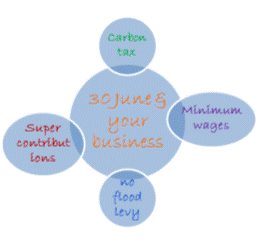I hope you find my writing and business tips and observations useful. My business and blog are dedicated to helping businesses communicate clearly and reach their potential.
Read, subscribe to my newsletter, enjoy!Tash
Is your business prepared for 2012-13?
 With one week to go in this financial year, I thought it a good time to remind you of some changes that come into effect on 1 July.
With one week to go in this financial year, I thought it a good time to remind you of some changes that come into effect on 1 July.
- the carbon tax starts – find out more about pricing impacts on the ACCC website
- minimum weekly wages increase by 2.9% so if you employ anyone at minimum rates (including apprentices, trainees and juniors) make sure you are meeting the Fair Work Australia requirements
- new individual PAYG tax rates change – namely the tax-free threshold is increasingly significantly. Make sure your payroll software has been updated with the new rates before your first pay run
- the flood levy finishes on 30 June so if you have been deducting this from employees’ pays, remember to stop!
- the superannuation co-contribution rate is halving to $0.50 per $1 you contribute, so if you qualify this year, you have a few days left to make a personal contribution to get this
- concessional superannuation contributions (those from your employer, salary sacrifice or that you claim a tax deduction on) will be capped at $25,000 regardless of your age or situation. Check your contribution rates for 2012-13 so you don’t get any nasty tax surprises…
Have you implemented all of the relevant changes for your business?
If you’re looking for some tips for the end of financial year, some of my previous posts may help:
Preparing for the end of financial year
Maximise your 30 June position
Keeping your accounting issues under control
Understanding profit and paying yourself
What increased super rates mean
 Last week, the Australian Government passed legislation that means the superannuation guarantee (SG) rates will gradually increase from 1 July 2013.
Last week, the Australian Government passed legislation that means the superannuation guarantee (SG) rates will gradually increase from 1 July 2013.
For employees, it’s clear – they will get more super in their account which should help them in retirement. I do support the idea of people retiring with more money and having less dependence on age pensions and the like.
But who will pay the extra 3% SG?
In simplest terms, employers will pay more super into their eligible employees’ super accounts. The Government will give tax concessions to that extra money which is what the mining tax is supposed to go towards.
There has been a lot of complaint in the last week from employers and employer groups about the need to find this extra 3% per employee – many had apparently thought the Government was somehow going to fund the increase.
Maybe the extra will come instead of pay increases for employees. But workers unions don’t agree with that concept and think the small percentage can be absorbed by businesses.
I don’t know the final answer and am not taking any political stand point on this either.
Small business people
For the self-employed, I don’t think we’re going to win from this deal.
I am self-employed so my super account only grows if I choose to make it so (or if I treat myself as an employee with a regular wage) – there is no compulsory super for me which means a change from 9% to 12% doesn’t have to affect my super savings.
As a small business I don’t have huge profits that would make it easy to increase employee salary packages by 3% (or the 0.5% steps).
My options would be to
- reduce pay increases to cover the SG (so their pay over the following 7 years may not increase much regardless of CPI)
- somehow reduce hours for existing staff (and that wouldn’t be fun for anyone really)
- pay the extra out of my profits (meaning my take home pay is decreased)
- increase prices enough to cover the super increases (of course, if clients don’t like that option my business suffers)
I do feel for small businesses with a number of employees as this could cause a lot of stress.
But I do agree with increasing savings for retirement. So is this a necessary pain for a few years for the greater good?
If you have a small business, what are your thoughts on the increased SG?
Product Disclosure Statements – what are they?
Do you know what a product disclosure statement (PDS) is?
Many people now use them, and various companies refer to them in their advertising, but from personal conversations about things I write, I know many people don’t know what the term means.
A PDS is simply a document listing the key features of financial products are described; it is the little booklet you got about your savings account, insurance policy, super account and so on. Basic topics covered by a PDS include fees, options, inclusions and joining/buying the product.
There are variations between industrires and companies but generally the company has to make a PDS available before you buy their product – they can’t make you read it obviously but they must have allowed you that opporutnity.
A PDS is a point of reference when deciding between products and when you need to know something later (eg does my house insurance cover rising water or just floods?) Many PDSs are long and may not be visually appealing, but they are worth holding onto.
Superannuation increases?
There is a move to increase the basic super contribution rate for employers on behalf of their employees, taking it from 9% to 12% (in a few increments).
The Australian Institute of Superannuation Trustees, AIST, (and others I believe) have an online petition to show the Government the concept has the support of the general population.
Do you support it?
Maybe you haven’t even thought about it so here are a couple of my ideas on the topic:
- an extra 3% of your salary each year has to give you a better chance of financial security in retirement so who would argue with getting it?
- we’re often told we have an aging population so I have long thought I will need my own money (super or otherwise) as there may not be much of an age pension when I retire – again, more super from an employer has to help that!
- an extra 3% on top of employee’s salaries could easily add up for any business owner so businesses may find the concept stressful, but
- it isn’t immediate so businesses can prepare
- if businesses have to increase prices to meet the 3%, living expenses will have another increase
- base salaries (for new employees) may get reduced slightly so that packages aren’t significantly higher and that again may leave people financially tight in the present
From a purely super point of view, I totally agree with moving the minimum to 12%; from an overall perspective, I’m not so sure what is best and will need to read up on the potential impact – and I’d love to hear some different opinions from business owners, too.

Recent Comments